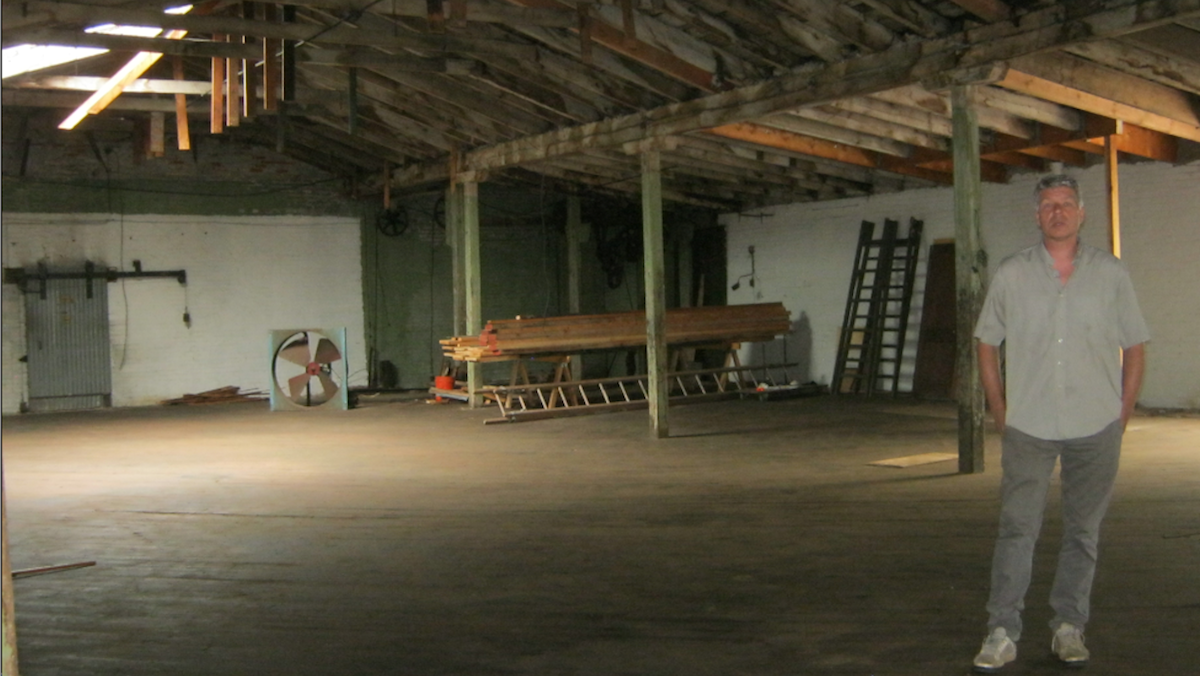Coming soon to Germantown: The Rittenhouse Soundworks Arts Complex

Jim Hamilton gives a tour of what will be the Rittenhouse Soundworks Arts Complex. (Alaina Mabaso/for NewsWorks)
Germantown resident Jim Hamilton has traveled the world drumming and recording for artists including Boyz II Men and Toni Braxton, but when it came to finding a space for the intercultural music and arts center of his dreams, the answer was literally right up Rittenhouse Street.
Last week, construction began inside a cavernous 13,000 square foot, 19th-century manufacturing space that stretches between Rittenhouse and Haines streets near Greene.
The two-story location, hidden behind an auto-mechanic shop, has sat vacant for decades, but Hamilton said the Rittenhouse Soundworks Arts Complex will be open by the end of the year.
Meet the owner
Born in Kensington, Hamilton grew up in his parents’ dance studios. A tap dancer who attended Northeast Catholic High School, he took up drumming in the seventh grade.
He never attended college, but his career has spanned 23 years of playing for the University of the Arts dance department, with time for multiple worldwide music tours and countless local bands full of international flavor.
Hamilton has lived on Rittenhouse Street for about 25 years, and has welcomed a plethora of notables to his basement recording studio and teaching space, from steel-drum ensembles to spoken-word artist Ursula Rucker.
“When I open my medicine cabinet, all I see are songs,” Hamilton said of how even the music of commercial jingles captivates him.
Due to his deep love for the universal underpinnings of all human music, any question you ask could become a meditation on the Yoruba tribe of West Africa, the origins of jazz and R&B, the Appalachian melting pot, the phonetics of rhythm, Catholic philosophy, European colonialism or the history of the drum set.
“It’s only through understanding and access, true access to another culture, that we’re going to be able to form a peaceful world,” the musician-philosopher insisted. “Let’s meditate. … Yeah, let’s be conscious, but also know that our ancestors have been been there, as we say in this neighborhood, for thousands of years.”
Unlike professional artists bent on self-promotion, it’s hard to get more than a line or two at a time from Hamilton about his impressive career path.
But, chat with him long enough and fleeting personal anecdotes emerge: Playing for sultans and at the Grammys, and meeting his wife, dance teacher Susan Deutsch, though the question of exactly how long they’ve been married is a tough one.
“We got married on leap year,” he said. “I think we’ve had five anniversaries. … I forget.”
Reclaiming the Philly sound
For years, Hamilton has imagined bringing an international teaching, recording and multimedia performance space to Philadelphia.
“After looking all over the city, to end up here on the same block, was incredible,” he said, giving NewsWorks a tour of his new space last week, just as the renovation plans were finalized.
The new complex will pay homage to the region’s history as a leader in American music.
“We’re back in business for the Philly sound,” he said. “The untold story about Philadelphia is we are what we actually export. Art [and] music [are] what we do.”
In addition to an international drumming school — complete with internet radio, podcast and video streaming capabilities, as well as digital, CD, analog tape or vinyl recording options — the new space will boast legendary performer and producer Sly Stone’s old API console.
Return of the ‘big room’
The size of the facility plays a role in Hamilton’s fervor.
“Most of the big rooms in the country have disappeared,” Hamilton said of the 21st century music industry. “I’m coming in after the collapse of big rooms and after the explosion of the home-studio revolution. What we’re doing is rebuilding the big-room concept in a way.”
That means, for example, having the space and acoustics to cut real strings on recordings, instead of using synthesizers. It’s about returning to the traditions that made institutions like the Philadelphia Orchestra famous around the world, he said.
“We’re going to bring it back, and move it forward,” Hamilton declared.
Education key
The intercultural element is also important to Hamilton’s vision.
“If you teach a kid from Kensington and a kid from Germantown how to play tabla … they’re gonna be a lot more tolerant of somebody [who] has a dot in the middle of their forehead,” he explained. “They’re gonna go, ‘Oh, you’re Hindu. Are you from India? Oh, where? North or south?'”
Hamilton said he also looks forward to many collaborations and partnerships with local arts and music organizations.
“The reason we found it now is because it’s time to do it now,” he said of stumbling upon the space after his long search. “This is the kind of thing that happens to me in my life: I’m not driving the car. I just have to listen.”
WHYY is your source for fact-based, in-depth journalism and information. As a nonprofit organization, we rely on financial support from readers like you. Please give today.




